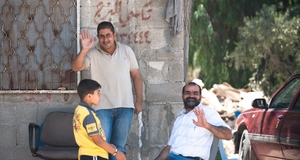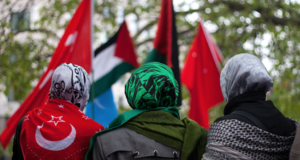Featured Opinion:The Right of Return: An Obstacle on the Road to Peaceful Negotiations Between Israel and Palestine
By
2012, Vol. 4 No. 01 | pg. 1/3 | »
IN THIS ARTICLE
KEYWORDS
AbstractThe level of displacement surrounding the Israel-Palestinian conflict is astounding. At this point there are over nine million Palestinian refugees scattered throughout the globe (King-Irani 924,). Arguing that their situation is dehumanizing and infringes upon their human rights, Palestinians have consistently demanded the right of return as a prerequisite for peace negotiations (Tovy 40). This paper argues, on the other hand, that if Palestinians seek the success of negotiations with Israel in the establishment of a two-state solution, this demand must be overlooked. As this paper argues, a rational Israel cannot be expected to agree to the right of return. Therefore if forward progress is to be made, the Palestinian negotiating arm must withdraw their demand for the right of return because it represents a roadblock on the path toward a peaceful solution between the two states. The Palestinian Diaspora currently consists of over nine million resettled Palestinians in countries and overcrowded refugee camps all over the world (King-Irani 924). Some Palestinians argue that the best way to counter their current situation is the creation of a two-state solution with a provision for the right of return (ROR) for all displaced Palestinians into the pre-1967 borders of Israel (Tovy 40). Indeed, the ROR has been central to Israeli-Palestinian negotiations (Tovy 40). However, as this paper reveals, the demand for the ROR is unrealistic and must be rescinded because it hampers the potential for effective negotiations. The paper also demonstrates that the lack of successful negotiations is leading to increased levels of violence and instability, as well as elevated mistreatment of the refugees in the region. A sovereign and rational Israel cannot be expected to welcome an influx of millions of frustrated anti-Zionists. In order to illustrate this assertion, this paper analyzes the history of the conflict between the two states, the basis for the Palestinians’ claim to the ROR, and past attempts at peace negotiations. After, it examines current dynamics that are negatively impacting the chances of successful negotiations including unintentionally damaging efforts by the international community, actions by authorities within the Occupied Palestinian Territories (OPT) and Israel that are further aggravating the situation, and the negative influence of the international media, specifically Al Jazeera’s “Palestinian Papers.” Next, since the dispersion of Palestinians is global but they want to return to a populated and sovereign state, the international and domestic impact of this situation is examined. Finally, this paper lays bare the prospects for a final solution to this issue – both what is needed for a solution to be legitimate and what is holding back the potential for a solution to be realistic.Historical BackgroundIn 1947, the United Nations (UN) passed a resolution that led to partition of Palestine and the creation of Israel as a separate Jewish state (Cole 9). This led to an immediate uprising by the Palestinians and Arab countries (Cole 9). The level of violence resulted in Palestinians exercising their right to protect themselves from violence by fleeing Israel (AbuZayyad 7). In 1948, the UN responded to the massive exodus by passing General Assembly Resolution 194 (hereby referred to as Res. 194) (Lapidoth). Res. 194 states that, “[Palestinian] refugees wishing to return to their homes and live at peace with their neighbors should be permitted to do so at the earliest practicable date” (Benvenisti 45; Lapidoth). This resolution implies that the conflict in the 1940’s greatly infringed upon the rights of the Palestinians, and that they deserve retribution and to return to their homeland. However, it is important to recall that, as a resolution by the UN, Res. 194 is non-binding (Cole 10). It is not meant to force, but to pressure Israel into action. Regardless of the lack of authority associated with resolutions, Res. 194 is the basis of the assertion that all Palestinians have the ROR (Cole 9). However, their unyielding support of the ROR, especially for all Palestinians, is groundless. At the time Res. 194 was passed, the UN also formed the “Conciliation Commission” (Benvenisti 450). The commission claimed that a plan to return the refugees to their homeland would have to be coordinated with Israel, that Israel must agree to the number of returning refugees, and that the number was final upon Israel’s agreement (ibid. 460). The Six-Day War that took place in 1967 also affected Palestinians’ interpretation of the ROR. It had two effects for the peoples living in this region; it increased the amount of land under Israeli control and the number of displaced Palestinians (Boqa’i 37; Lapidoth). Many of these Palestinians became internally displaced persons (IDPs) living inside of Israel as second-class citizens.Others escaped to the West Bank (where they were later placed under Israel’s military rule) or sought refuge in Arab lands (Boqa’i 37). In response to this exodus, the UN Security Council issued Resolution 237 (Res. 237) (Lapidoth). Res. 237 encourages Israel “to facilitate the return of those inhabitants who have fled the areas since the outbreak of hostilities [due to the Six-Day War]” (Lapidoth). Additionally, in other negotiations with regional actors Israel has agreed to resolve the refugee issue (Lapidoth). However, it is critical to recognize that Palestinians’ ROR to Israel has not been mentioned in any of the negotiations or treaties after Res. 194 (Lapidoth). However, many Palestinians continue to endorse the ROR and maintain that it applies to the displaced Palestinians of the 1940’s, 1960’s, and their descendents (Jacir). Obviously, Palestinians’ support of the ROR is deeply entrenched into their psyche. In fact, giving up the ROR is often equated to treason (AbuZayyad 8; Tovy 450). Thus 85 percent of Palestinians say they would not support a negotiation if it compromised on the ROR (Omer-Man). This insistence greatly affects negotiation attempts. For decades the Palestinians have maintained that Israel must accept responsibility for the refugee problem and allow all Palestinians the opportunity to partake in the ROR into Israel’s pre-1967 borders for a compromise to be acceptable (Tovy 40). However, during these negotiations, Israel’s refuses to acknowledge the ROR and denies responsibility for the displacement (Ibid.). They argue that aggression by the Arab states in 1948 led to the first massive exodus (Cole 9; Tovy 4). Additionally, Israel argues that the ROR would endanger the Israelis living in the settlements and change the demographics of Israel to make it no longer a “Jewish state” (AbuZayyad 9; Gover; Tovy 40). Despite the inherent contradictions in these positions, bilateral and multilateral negotiations have attempted to establish peace in the region; unsurprising, it has been to no avail. An example of one of the more recent negotiation attempts occurred in September 2000 and involved Israel, the OPT, and the United States of America (Tovy 46). During these negotiations, former President Clinton proposed the “Clinton Parameters” (Ibid.). This proposal is significant for two main reasons. Firstly, it demonstrates the Palestinians’ level of persistence to maintaining their support for the ROR, even as they overlook other historical facts – such as the UN stating that Israel could choose the number of refugees it accepts. Secondly, solutions suggested by the United States have continued to follow the Clinton Parameters, thus making it important to understand the concessions of this particular solution (for this reason, this paper will also conceptualize this solution as the frame of its two-state solution) (“President Obama”). The Clinton Parameters recommends two different land swap options (both of which give the majority of the West Bank and all of Gaza to the Palestinians), that East Jerusalem be placed under Palestinian authority, and that Palestinians would have a “moderate” ROR, allowing them to return to the future Palestinian state (Gassner 76; Tovy 46). If Palestinians did not want to live inside the OPT, they would have the right to become a resident in a different state, including - if they had family there and the government approved of the relocation – Israel (Tovy 46). Although Israel supported this compromise, the Palestinian Authority rejected it. They argued it gave Israel too much illegitimate power by letting it choose the number of refugees allowed in its borders (Tovy 47). While the disagreements between these states’ envisioned solutions is expansive, it is critical to continue searching for solutions, lest the refugees’ frustration leads to further violence (Aronson 7; Rabinowitz 495). One method to try to find workable solutions is to study the current dynamics between the countries to examine where a resolution lies. Current DynamicsOne of the dynamics in this situation is the continued dehumanization of refugees. In addition to leading to violence, the statelessness of the refugees is leading to Palestinians living in inhumane conditions in refugee camps throughout the world (Jacir, McCann 87, Siklawi, Sohl). While in some countries refugees are guaranteed citizenship and the ability to work, this is not always the case (McCann 87). For instance in Lebanon, Palestinians are denied citizenship and employment from 79 kinds of jobs and have to apply for permits to live in a different camp (Jacir, McCann 87). To counter this demoralizing situation, the UN created the UN Relief and Works Agency for Palestine Refugees in the Near East (UNRWA) (McCann 83). The original objective of UNRWA was to “prevent starvation and distress and to further the conditions for peace and stability” (McCann 84). They have since expanded that mission to provide education programs, healthcare, food aid, and women’s centers (McCann 85 and 88). Although the UNRWA has greatly benefited the refugees, the fact that people continue to live in awful conditions must not be overlooked (Jacir; Sohl). A solution establishing a stable Palestinian state would benefit these refugees by providing them with more rights and opportunities. Those suspicious of UNRWA claim that it is perpetuating the refugee problem by continuing to allow the Palestinians to survive, while the Israelis continue their “colonialist actions” (Abunimah, Gover, King-Irani 927-8, McCann 86). Israeli colonialism is demonstrated by the actions the Israeli government takes based on its interpretation of the needs of its citizens and the state at large (Aronson 6). An example of government nonintervention relates to Jews looting and then moving into Arabs’ houses starting in the 1950’s and continuing today (Abdelrazek 91-92). Although Res. 194 dictates that these actions are illegal, the Israeli government does not actively attempt to end the ownership of refugees’ property (Abdelrazek 92). Historical dispossession also continues to affect IDPs in Israel because it led to perpetuating economic challenges and underdevelopment due to a lack of access to resources and land (Boqa’i 35-36). Understandably, Israel’s treatment of the refugees’ and IDPs’ property, coupled with the dehumanizing experiences that refugees are facing has led to Palestinian frustration.Continued on Next Page » Suggested Reading from Inquiries Journal
Inquiries Journal provides undergraduate and graduate students around the world a platform for the wide dissemination of academic work over a range of core disciplines. Representing the work of students from hundreds of institutions around the globe, Inquiries Journal's large database of academic articles is completely free. Learn more | Blog | Submit Latest in Political Science |
















